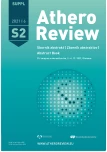33PS Endoglin blockage is essential in hypercholesterolemia and hyperglycemia induced endothelial dysfunction in HAECs
Authors:
Tripska K 1; Igreja E Sá Ic 1; Vicen M 1; Havelek R 2; Eissazadeh S 1; Vitverová B 1; Nachtigal P 1
Authors‘ workplace:
Department of Biological and Medical Sciences, Faculty of Pharmacy in Hradec Kralove, Charles University, Czech Republic
1; Department of Medical Biochemistry, Faculty of Medicine in Hradec Králové, Charles University, Czech Republic
2
Published in:
AtheroRev 2021; 6(Supplementum 2): 23
Category:
Overview
Introduction: It has been demonstrated that exposure of endothelial cells to hypercholesterolemia and hyperglycemia leads to increased levels of endoglin and cell adhesion molecules, as well as increased adhesion and transmigration of monocytes through endothelial monolayer. Carotuximab (TRC105), a monoclonal antibody that binds to endoglin, was originally developed for the use in oncology. However, there are no studies available to elucidate potential role of carotuximab treatment on Eng expression, signaling and function with respect to endothelial dysfunction development and/or prevention. Aim: Therefore, in this study, we hypothesized that carotuximab treatment prevents 7-ketocholesterol and hyperglycemia induced development of endothelial dysfunction by direct effect on Eng expression, signaling and function. Material and Methods: Human aortic endothelial cells (HAECs), passage 5, were cultured in EGM-2 media with appropriate supplements and 10% FBS until reaching 80% confluence. In hypercholesterolemia studies, cells were treated with carotuximab (300 µg/mL) for 1 hour, followed by addition of 7-ketocholesterol (10 µg/mL) for another 12 h. In hyperglycemia studies, cells were exposed to high glucose (45 mM) for 60 hours, followed by addition of carotuximab for another 12 hours and cells treated with 5 mM glucose and 40 mM mannitol served as osmotic control. Gene expression was measured by qRT-PCR. Protein levels, adhesion and transmigration of monocytes were assessed by flow cytometry. Results: Carotuximab pretreatment reduced endoglin protein expression and signaling in both hypercholesterolemia and hyperglycemia induced endothelial dysfunction. Despite increased expression of cell adhesion molecules carotuximab blockage of endoglin prevented increase of adhesion and transmigration of monocytes through endothelial monolayer in both hypercholesterolemia and hyperglycemia induced endothelial dysfunction. Conclusion: These results suggest that carotuximab-mediated endoglin blockage is essential in hypercholesterolemia and hyperglycemia induced endothelial dysfunction in HAECs and therefore that endoglin might be an interesting therapeutical target in diseases characterized by elevated cholesterol and glucose.
Labels
Angiology Diabetology Internal medicine Cardiology General practitioner for adultsArticle was published in
Athero Review

2021 Issue Supplementum 2
-
All articles in this issue
- 09ÚS Post mortem vyšetření náhlé srdeční smrti: výstupy
- 08ÚS Multifaktoriální chylomikronemie
- 10ÚS Metabolický syndrom a dyslipidemie u pacientů po onkologické léčbě
- 11ÚS Mechanizmus antiinflamačního vlivu statinů
- 12ÚS Velikost lidských adipocytů a rizikové faktory aterosklerózy
- 13ÚS Perivaskulární tuková tkáň – význam polarizace makrofágů v iniciální fázi aterogeneze
- 14ÚS V soutěži oceněná publikace: Vliv artificiální pulzatility na periferní vaskulaturu u pacientů s mechanickou srdeční podporou s kontinuálním průtokem
- 15ÚS Zkušenosti s léčbou lomitapidem u pacientů s homozygotní familiární hypercholesterolemií
- 16ÚS Těhotenství žen s homozygotní formou familiární hypercholesterolemie: série kazuistik
- 17ÚS Jsou grafická zjednodušení výživových doporučení správná?
- 18ÚS Zvýšený pulzatilní index v karotickém řečišti je spojen s výskytem nežádoucích událostí u pacientů s implantovanou mechanickou srdeční podporou
- 19ÚS Soluble endoglin: Anything new and interesting?
- 20ÚS Lipidom a inflamatorní proces v patogenezi aterosklerózy – nové poznatky
- 21PS Změny v lipidogramu a glykovaného hemoglobinu po otěhotnění a v průběhu těhotenství
- 22PS Kvantifikace cirkulující dárcovské DNA v plazmě u pacientů po transplantaci srdce jako potenciální biomarker poškození štěpu
- 23PS Gen pro FTO ovlivňuje riziko vzniku akutního koronárního syndromu v závislosti na pohlaví
- 24PS Empagliflozin zmírňuje metabolické poruchy spojené s rozvojem nealkoholické jaterní steatózy
- 25PS Zhoršený metabolizmus lipidů a cytochromu P450 v játrech předchází dyslipidemii v séru u postmenopauzálního metabolického syndromu
- 26PS Využití chytrých hodinek ke kardiorehabilitaci pacientů po infarktu myokardu: pilotní výsledky studie SmartRehab.
- 27PS Vliv statinů na polarizaci makrofágů in vitro
- 28PS Detekce eozinofilních granulocytů v lidské tukové tkáni a jejich vztah ke kardiovaskulárním rizikovým faktorům: pilotní studie
- 29PS Analýza spektra plazmatických žlučových kyselin u cholesterolové cholelitiázy
- 30PS Vliv obezity na obsah tuku v játrech a hladinu VLDL po 60hodinovém hladovění
- 31PS Metabolické a renoprotektivní účinky empagliflozinu u spontánně hypertenzních potkanů exprimujících lidský C-reaktivní protein
- 32PS Triglyceridy, polymorfizmy a riziko akutního koronárního syndromu v české populaci
- 33PS Endoglin blockage is essential in hypercholesterolemia and hyperglycemia induced endothelial dysfunction in HAECs
- 01ÚS Labetalol treatment exacerbates estrogen-induced liver damage
- Změny kardiovaskulárních, metabolických a zánětlivých parametrů po ovariektomii a náhradní hormonální léčbě u experimentálního modelu inzulinové rezistence
- 03ÚS Indexy polyenových mastných kyselin omega-3 a omega-6 s dlouhým řetězcem v plazmatických fosfolipidech u osob s vysokým kardiovaskulárním rizikem
- 04ÚS Prvé skúsenosti s analýzou počtu a rozmerov lipoproteínov metódou protónovej nukleárnej magnetickej rezonančnej spektroskopie
- 05ÚS Polygenní skóre a riziko ICHS a ICHDK u pacientů s T2DM
- 06ÚS Stanovení hypertriglyceridemického genového skóre u pacientů s familiární dysbetalipoproteinemií
- 07ÚS Polymorfizmy ABCG5/G8 u osob s obezitou a nadváhou a jejich vztah ke kardiometabolickým rizikovým faktorům
- Athero Review
- Journal archive
- Current issue
- About the journal
Most read in this issue
- 08ÚS Multifaktoriální chylomikronemie
- 09ÚS Post mortem vyšetření náhlé srdeční smrti: výstupy
- 26PS Využití chytrých hodinek ke kardiorehabilitaci pacientů po infarktu myokardu: pilotní výsledky studie SmartRehab.
- 18ÚS Zvýšený pulzatilní index v karotickém řečišti je spojen s výskytem nežádoucích událostí u pacientů s implantovanou mechanickou srdeční podporou
